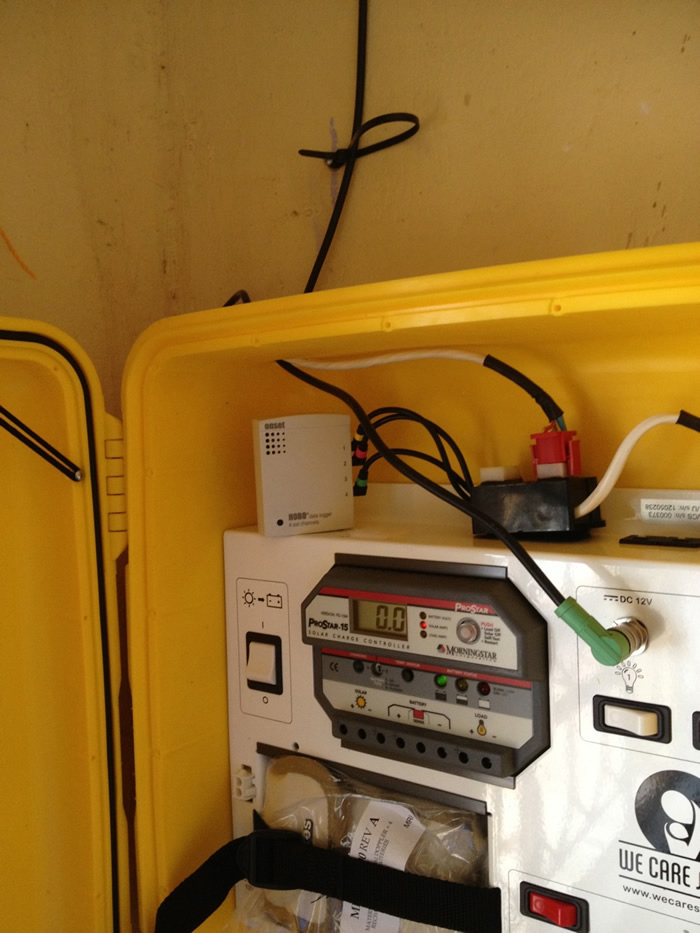The WE CARE Solar team required a better way to log system performance data and monitor usage patterns to ensure that correctly-sized PV power systems were being implemented in the medical clinics.
Contributed by | Onset
Overview
WE CARE Solar, a non-profit organization in Berkeley, California, provides what’s known as the Solar Suitcase, a small, off-grid photovoltaic (PV) power system and lighting solution housed in a rugged case. Since 2009, these systems have provided light and power to remote medical clinics throughout the developing world. Currently, Solar Suitcases can be found in nearly 300 clinics across 18 countries. Many of these clinics have no other sources of electricity or light because of their remote locations and great distances from the electrical grid. Others receive only sporadic power, due to frequent electrical grid outages. Most rely on kerosene lanterns or candlelight to perform common medical procedures, and even to complete surgeries. Such conditions make the Solar Suitcase an extremely welcome addition to a clinic’s suite of equipment.
Challenge
Regional differences in climate and available sunshine from site to site make it difficult to determine proper system sizing (the matching of PV module size, battery size, and user loads). Systems with undersized PV modules for the users’ energy loads can suffer from chronic battery undercharging, causing battery failure. Systems outfitted with a battery that’s too small for the users’ energy needs can experience deep battery cycling, also leading to short battery life. Knowing a site’s energy needs and available solar energy are critical to designing a properly balanced system that will remain operational for years to come.
Although the team makes every effort to ensure each system has been properly sized for its geography, monitoring system performance makes it possible to discover installation deficiencies, quantify use patterns, and identify areas for future design improvement. Because the systems are often located in remote, rugged environments, it’s difficult for WE CARE Solar staff to visit them on a regular basis once they’re installed. When the Solar Suitcase program first began, system performance was monitored via human data-entry in system logbooks; however, the data were often incomplete, inconsistent, and subjective. The WE CARE Solar team required a better way to log system performance data and monitor usage patterns to ensure that correctly-sized PV power systems were being implemented in the medical clinics.
Solution
To understand the performance of installed Solar Suitcase systems, the WE CARE Solar team researched various data logging technologies, eventually deciding on the Onset HOBO® U12-006 4-Channel data logger as the most efficient and cost-effective solution.

Because energy is precious to the clinic sites, these self-powered data loggers were immediately attractive. The compact HOBO data loggers can collect data for months without need for human interaction, and therefore can be incorporated into the Solar Suitcase installation without need for further user training. Accompanying HOBOware® software is used to download the collected data and graph and analyze the results. In-country technical staff, already traveling periodically to outlying clinics for other work, could quickly be trained to offload and transmit the collected data files back to team members in the United States. By monitoring the photovoltaic voltage, battery voltage, and load usage, the team could quickly get a snapshot of system performance and use patterns.
Results
In November 2011, the WE CARE Solar team worked with healthcare technicians in Northern Nigeria to install Solar Suitcase systems in a number of regional clinics. Systems at six representative sites were outfitted with a HOBO U12 data logger, with three of the channels directly connected to take voltage readings at key points within the PV power system. A small voltage divider circuit was used to scale the 12V nominal voltages down to proper levels for the HOBO U12’s inputs. These connections allowed the logger to track PV voltage, battery voltage, and user load voltages. The loggers were set to record at 15-minute intervals, and the data collection continued over a period of approximately six months. Once collected, the logged data were processed and integrated to determine energy production, battery cycle depth, and daily power usage, all of which are critical in determining system health and use profiles.
When the data were analyzed, the WE CARE Solar engineers were pleased to see that the power systems were all continuing to operate as designed. The data clearly showed when, and for how long, the systems’ LED lights were being used each night. It also confirmed that all batteries were receiving a full charge nearly every day, which is key to ensuring a long battery life. In several cases, the collected data even showed that smaller photovoltaic modules could have been used. This knowledge will enable the WE CARE Solar Team to leverage smaller, less-expensive PV modules for future installations, and ultimately save money that will allow the group to power more clinics.
The information gained from the Nigeria project was directly applied to system design for an installation this spring in Southwestern Uganda. Famous for the “Gorillas in the Mist” movie setting, this part of Uganda is known as a difficult climate for solar generation because of frequent fog, dense foliage, and hilly terrain. The team used data gathered from the Nigerian systems to appropriately design new Solar Suitcases for the Ugandan climate, and traveled there in February 2013 to install units in nine remote medical clinics. These systems will generate power and light for the clinics, while the HOBO U12 data loggers collect data that will be collected and analyzed this summer, after the rainy season. It’s anticipated that these data will offer invaluable input to both the design and installation of 200 more Solar Suitcase systems slated for implementation later in 2013.
The content & opinions in this article are the author’s and do not necessarily represent the views of AltEnergyMag
Comments (0)
This post does not have any comments. Be the first to leave a comment below.
Featured Product



